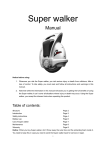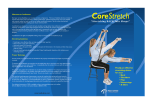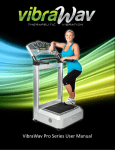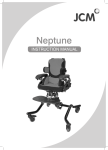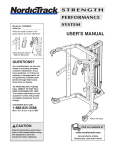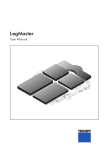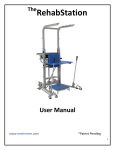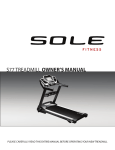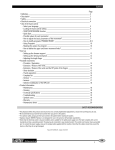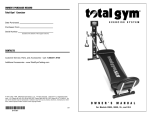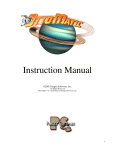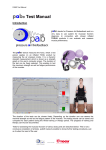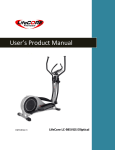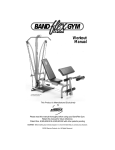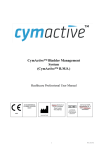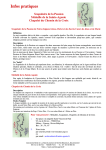Download PT Instruction Manual
Transcript
PHYSICAL THERAPY PROTOCOLS PLEASE READ THIS MANUAL CAREFULLY AND COMPLETELY BEFORE BEGINNING ANY TRAINING PROGRAM. This manual contains important information to prevent injury and equipment damage. Please follow the instructions listed herein to ensure a safe, healthy, and effective experience with Core Stix. Table of Contents Important Warnings and Safety Information 1 Exercises for the Upper Body 2 Exercises for the Lower Body 4 Balance, Core & Spinal Stability Exercises 6 Exercises for Increasing Flexibility 8 A Message About Exercise Safety From Founder Mike Kadar 10 © 2015 Core Stix LLC. CORE STIX and the Core Stix logo are registered marks of Core Stix Fitness LLC . Use in any manner is prohibited without prior written approval from Core Stix Fitness LLC. This manual and all contents thereof are the sole property of Core Stix LLC, and are protected by all applicable copyright laws. No portion of this manual may be reproduced without the prior written consent of Core Stix LLC. Printed in the USA. Please follow all instructions listed herein to ensure a safe, healthy, and effective experience with Core Stix. Important Warnings and Safety Information Please read this section carefully and completely before beginning any training program. Misuse of the Core Stix equipment can result in damage to the equipment and/or serious bodily injury. It is therefore important to adhere to the safety and use guidelines contained in this Manual to prevent damage and injury. Please consult the User Manual for a complete list of warnings and safety information. 60° MAX BEND ANGLE NEVER BEND STIX MORE THAN 60° AND ENSURE STIX ARE FULLY ENGAGED IN HOLES AT ALL TIMES DURING USE TO PREVENT EQUIPMENT DAMAGE AND BODILY INJURY. 60° MAX BEND ANGLE Core Stix is not designed to work with any other equipment other than what has been supplied or approved by Core Stix. Do not use any other equipment with Core Stix other than what has been supplied or approved by Core Stix. Usage of unapproved equipment can result in damage, injury, and will void the warranty. The Core Stix board must be used on a flat, level, and well supported surface with 36 or more inches of clearance on all sides of the base. Bystanders should be 48 or more inches away from the base when in use. Always maintain proper balance during every exercise when using Core Stix. The Insert Pin for each of the Stix being used must be fully inserted in the desired hole of the Arc Support before any force is exerted on the Stix, and during the entire workout. Partial engagement of the Stix in the holes can cause personal injury and damage to the equipment. Correct The insert pin is fully inserted. The Stix are ready for use. Incorrect The insert pin is not fully inserted! Do not bend the Stix in this position. Arc Support Insert Pin Hand Positions There are 8 body positions used throughout the Core Stix training materials. Abbreviations for each position are noted in bold type below the photos; these abbreviations are used in the exercise descriptions that follow. The following are the three basic Hand Positions on the Stix: Position 1 (top of the foam handle) 1 | P a g e Legend: Arc Female Position 2 (middle of the foam handle) Male | Stix: X-Lite Lite Position 3 (bottom of the foam handle) Medium Heavy X-Heavy Exercises for the Upper Body STANDING BILATERAL EXTERNAL ROTATION Starting Posture: Knees soft, elbows bent 90° holding a rolled - up towel against your ribs, core engaged. C3 Action: Externally rotate arms as far as possible without letting the elbows float away from ribs. Do not drop towel. STANDING BILATERAL INTERNAL ROTATION Starting Posture: Knees soft, elbows bent to 90° and holding a rolled up towel against ribs, core tight. A3 Action: Externally rotate arms as far as possible without letting the elbows float away from ribs. Do not drop towel. STANDING REVERSE FLY FLUTTERS Starting Posture: Stand with feet parallel, hands turned Backwards on Stix, arms at 45° from shoulders. A3 (D2, D4) Action: Squeeze shoulder blades driving Stix back 6 inches and return. STANDING ROW Stand staggered stance, hands at position 1, core engaged, weight balanced between feet Starting Posture: B4 (B5) Action: Pull handles in toward body with rowing motion, keeping elbows close to sides. STANDING ROW WITH SCAPULAR STABILITY Starting Posture: Stand staggered stance, hands at position C4 (C5) 1, core engaged, weight balanced between feet. Action: Pull handles in toward body with rowing motion. Squeeze scapulae. 2 | P a g e the superficial muscles of the core than training in supine or seated positions. Exercises for the Upper Body (cont.) KNEELING WIDE W PULL-DOWN Starting Posture: Grab Stix at position 1. A4 Action: Keeping upper body upright, pull handle toward body leading elbows back and down (“into your back pockets”), core engaged, squeeze scapulae together. End in a W. SEATED PULL DOWN B4 Starting Posture: Grab Stix at position 1. Action: Keep elbows in and pull handles toward body keeping chest out, core tight. ARCHER ROW (KNEELING) Starting Posture: Kneeling on one knee, with the hand opposite the forward leg at position 1, core engaged. B4 Action: Keeping spine stable and hips facing forward. Pull handle down toward chest. While at the same time rotating shoulders & turning torso toward hand. Hand should end up at sternum. STANDING DIP Starting Posture: Standing with knees slightly bent, rear facing, feet slightly staggered, hands in position 1. Elbows bent, and tucked against sides, core engaged. B3 (C3) Action: Keeping elbows close to sides, push Stix downward, keeping hands close to sides. Shoulders should be down and remain down throughout exercise. Can be performed in seated position also. (Progression: Stix in C3, press slightly outward to increase shoulder stabilization.) KNEELING SHOT-PUT Starting Posture: Kneel on left knee, right foot forward. Left hand grabs Stix at position 2. Hips are rotated to the left, with left foot straight behind body Action: Rotating thru the hips, press left hand upward. Focus on keeping the spine neutral, and initiating the movement through the hips. Hold finish position, squeezing left glute. B2 3 | P a g e the superficial muscles of the core than training in supine or seated positions. Exercises for the Upper Body (cont.) STANDING PRESSES Starting Posture: With feet slightly staggered, hands in position 2, core engaged. Action: Press Stix away from the body, with absolutely no body sway during exercise. If there is, reduce the resistance or move the user back a bit until they can control their core. (Progression: unilateral either with opposite arm in contracted or relaxed position.) B3 (B2) STANDING PUSH - PULL Starting Posture: Left foot forward in a narrow staggered stance, hips straight forward, weight balanced between feet, shoulders and thoracic spine slightly rotated to the right. Hands at position 2. B5/B3 Action: Simultaneously push the right and pull the left Stix, shoulders and thoracic spine rotate from right to left. (Progression: C5/C4 for added scapular stability and thoracic rotation) Adjust Stix and alternate sides. Exercises for the Lower Body SQUAT Starting Posture: Feet parallel at #5, knees soft, core engaged, and hands at position 1. C1 Action: Squat down low by sitting down and back; low back may be slightly arched. Drive back up through heels to stand upright, keeping back neutral. ASSISTED SQUAT Starting Posture: Stand feet parallel, knees soft, core engaged, and hands at position 1. B4 Action: Pull Stix slightly back at the start position. Using Stix as counter balance, sit back into a squat. Keep spine neutral, weight on heels. (Alternative: Stix in B2, facing Arcs with overhand grip – simulates sit to stand) 4 | P a g e the superficial muscles of the core than training in supine or seated positions. Exercises for the Lower Body (cont.) FORWARD DRIVE Starting Posture: Standing with Stix by shoulders. Hands at positions 2-3. Walk feet back to form 45° angle, reach one leg back slightly, weight on balls of feet. B3 Action: Using forward leg glutes, drive other knee up & forward, stay on ball of forward foot. Keep elbows bent and Stix close to shoulders. Stay tall on forward foot (activates Glute Med.) Extend arms for progression. SPLIT SQUAT Starting Posture: Stand left foot in front, right foot behind. Action: Squat down to 90°, bend each knee. Grab Stix and stand upright. Maintain tall posture, shoulders slightly retracted. Weight on heel of left leg, drive heel down into board each rep. (Repeat on opposite leg) A1 (B1) ASSISTED SPLIT SQUAT Starting Posture: Stand right foot in front of left. Rear foot can be positioned off board. B3 Action: Grab Stix firmly. Squat to a 90° bend using Stix for support. Weight is on heel of right leg, driving down with each rep. (Repeat on opposite leg) Note: User must have adequate grip to do this exercise. (Regression: For users with lower grip, insert Stix in B3, facing away from Arcs, hands gripping downward. SIDE STEP UPS Starting Posture: Standing erect right side facing Arcs on end of board, hands at position 1. Right foot on board & left off. Stix held close in front of the body. C1 (B1) Action: Step onto board with right leg only. At top of movement, balance on right leg, using Stix for resistance & assistance. At top of movement add left leg abduction or extension to progress. DEAD LIFT Starting Posture: Bend forward, hinging at the hips, back flat, knees bent. C1 (B1) Action: Extend hips and stand upright, keeping back flat. Keep weight in heels, hips shifting backwards during descent, driving forward through the lift. 5 | P a g e These exercises may not be suitable for all users. Please adjust the exercises to fit the user’s ability. Exercises for the Lower Body (cont.) ONE LEGGED ROMANIAN DEAD LIFT LEFT Starting Posture: Stand on left leg, left knee slightly bent right knee straight. C1 Action: Hinge hips maintain neutral spine. Extend right leg behind body maintain straight line with torso. Grab Stix, squeeze hamstring drive hips forward & stand upright. Keep right leg straight & inline with upper body. REVERSE LUNGE WITH EXTERNAL ROTATION Starting Posture: Stand with left foot on slider, left hand on Stix at position 1. E3 Action: Slide left foot toward back of board turning toes out toward 9 o’clock. At same time, bend right knee to 90°, keep weight on right leg. Left hand pulls Stix so that it finishes directly in front of sternum. Return to start position. Do not let Stix pull you back up. STANDING HIP ABDUCTION Starting Posture Standing off the back of the board, right foot up against the Stix. Action: While pushing down with the left foot into the ground, slightly hike the right hip to keep right foot off of the ground. Abduct the right leg out to the side while standing tall on the left leg, hold slightly at the end of ROM, return. C1 Balance, Core, and Spinal Stability Exercises MARCHING Starting Posture: Grab Stix and squeeze together with hands in front of body. C2 (B2) Action: Slightly lean forward and alternate lifting each knee. Keep firing glute, quad, and calf of support leg to maintain stability. Extend up onto ball of support leg. STANDING STIR THE POT Starting Posture: With feet parallel, knees soft, core engaged. Both hands grab at position 2 of one Stix and bring to sternum. Action: Like stirring a pot, move hands/Stix in a circular motion. Reverse Directions. Switch sides. 6|P a g e E2 & E4 Balance, Core, and Spinal Stability Exercises (cont.) KNEELING OFFSET ROW (ADVANCED) Starting Posture: Kneeling with left knee on the center of board #5, left foot centered #3. Grab Stix and pull in line with body so that hands are in line with shoulders. Maintain good posture. A3/ C3 Action: Perform pull-down, keeping hands always in line with shoulders. Return via the same path. (Repeat on other side - switch legs and Stix (C3/A3). LYING OFFSET HOLDS Starting Posture: Feet close with right Stix touching right thigh at start, head & spine in neutral. Hands position 2, arms straight. A2 & C2 Action: Initiate with left arm, pulling arm so it is extending straight away from body. Once core is stable, bring right arm straight-ahead as well. Hold. LYING KNEE 90° HOLDS Starting Posture: Bend knees & hips in both legs to 90° & hold feet in elevated position. C2 Action: Arms straight, grab Stix & separate 12-16”. Press down toward Arcs to further activate core. Hold position. LYING KNEE 90° MARCHING Starting Posture: Bend knees and hips in legs 90° & hold feet in elevated position. Action: With arms straight, separate Stix 12-16”. Press toward Arcs to further activate core. Maintain 90° bend & neutral spine, drop leg toward Arcs & tap ground. Return to start. Repeat with other foot. C2 SIDE PLANK CHEST FLY Starting Posture: Side lying with left elbow off of the back of the board (adjust for height) feet stacked in front of the center Arc, lift hips until body is straight. C2 Action: Right hand on Stix, perform a chest fly with right hand while maintaining perfect posture in side plank. (Progression: Instead of a fly, perform a circle with right arm) 7 | P a g e Questions or feedback? Contact us at [email protected] or 855-COR-STIX and let us know. Exercises for Increasing Flexibility SEATED OBLIQUE/QL STRETCH E3 Starting Posture: Facing the right side of the board, hands at position 1. Action: Allow the Stix to pull you into a side stretch. Hold 15-30 seconds. OVERHEAD KNEELING HIP FLEXOR STRETCH Starting Posture: Kneeling on right knee, left foot forward. Arms overhead hands at position 1. D3 Action: Lunge forward onto forward leg. Hold 15-30 seconds. SEATED HAMSTRING STRETCH Starting Posture: Seated on a ball or stool, hands at position 1. B4 Action: With one leg straight in front of you, allow the Stix to pull you forward into the stretch. Hold 15-30 seconds. SEATED ADDUCTOR STRETCH Starting Posture: Seated on a ball or stool, hands at position 1. B4 Action: Legs spread wide, one leg straight with the opposite bent. Allow the Stix to pull you forward into the stretch. Hold 15-30 seconds. SEATED LUMBAR DECOMPRESSION STRETCH Starting Posture: Seated on a ball, hands at position 1. B4 Action: Knees bent, back rounded; allow the hips to sink back slightly rolling the ball away from the Arcs. Allow chest to relax toward/on thighs. Hold 15-30 seconds. STANDING CALF STRETCH Starting Posture: Standing with toes on the back of the board and heels off, use the Stix as balance aid. B4 Action: Allow heels to relax back off of the board. Heels should touch the ground. Lean forward slightly to increase intensity. Hold 15-30 seconds. 8 | P a g e Questions or feedback? Contact us at [email protected] or 855-COR-STIX and let us know. Exercises for Increasing Flexibility (cont.) STANDING WIDE ARM CHEST STRETCH (STEP THROUGH) Starting Posture: Stand between Stix at #1. Hand position 2, thumbs up. A4 Action: With elbows soft, step forward with one foot; arms remain outstretched and back. Keep head neutral, core engaged. Repeat with hands high (position 1) and again with hands low (position 3). STANDING WIDE ARM BICEP STRETCH (STEP THROUGH) Starting Posture: Stand between Stix at #1. Hand position 1, thumbs down. B4 Action: With elbows soft, step forward with one foot; arms remain outstretched and back. Keep head neutral, core engaged. REAR DELTOID CROSSOVER STRETCH Starting Posture: Stand in wide stance at #1. Right arm reaching across body, grab left Stix with thumb up. A4 Action: Lean body to the right simultaneously bending into the right knee and hold. SEATED CROSSED BENT OVER LAT STRETCH Starting Posture: Stand with a wide stance, arm’s length from Stix. Grab the left Stix with right hand and right Stix with the left hand. B4 Action: Hinge from hip, bend knees slightly. Back straight. Bend forward arms extended & head neutral. STANDING OVERHEAD TRICEPS STRETCH Starting Posture: In a standing position, right arm overhead, elbow bent fully. Action: Grab one of the Stix with right hand, allowing the weight of the Stix to begin stretch of the right triceps. Place left hand behind the back and pull down lightly on Stix for further stretch. Hold 15-30 seconds. SEATED PIRIFORMIS STRETCH B4 Starting Posture: Seated on a ball or stool, hands at position 1. Action: Cross right ankle over left knee then allow the Stix to pull you forward into the stretch. Hold 15-30 seconds. 9 | P a g e Learn more protocols & routines in our Certification Workshops. Email us at [email protected] for more info. A Message About Exercise Safety from Originator Mike Kadar Safety is one of the biggest benefits of using Core Stix. The safety of the equipment when exercising is crucial for performing all exercises properly and avoiding injury. The safety of the equipment is also crucial for the performance and health of one’s muscles, joints, tendons, and ligaments. This is one of the greatest benefits of Core Stix. The Stix provide for constant progressive resistance that offers a safe and challenging workout for many people at many different fitness levels. One benefit is that you can slow down your workouts with controlled movements or make your workouts more dynamic with faster movements with any of the variety of different Core Stix resistance Stix without sacrificing the health of your muscles, joints, tendons, or ligaments. With each repetition on Core Stix, whether slow or fast, whether controlling or building momentum in your movement, your muscles are never compromised with any “kick back motion” that a free weight or cable machine might impart on you. Also, there is no angular joint compromise with any of the movements you perform on Core Stix. Simply adjusting your, feet, hands, body, or any combination thereof can give you the proper anatomical angle to perform any exercise safely and effectively. Having your muscles and joints at the proper angle can decrease or eliminate pain through any movement. Exercises can be uncomfortable when performing the movements, due to the fatigue and burn in your muscles, but exercise should never be painful. Most machines have a few settings to adjust the angular displacement, but cannot permit a user to fine tune the body position and movement like Core Stix can. You are never locked into one position, whether sitting, kneeling, or standing. Core Stix allows your body to move freely rather than locking you into a preset position. This allows for natural movement of your body, creating less chance of pain or injury, while at the same time engaging and working your core in the must functional way possible. We hope that using the Core Stix system for Upright TrainingTM will help you achieve all of your and your patients’ fitness goals safely and effectively, and provide the basis for a lifetime of good health! Sincerely, Mike Kadar. NHL Pittsburgh Penguins Strength Coach & Core Stix Originator












